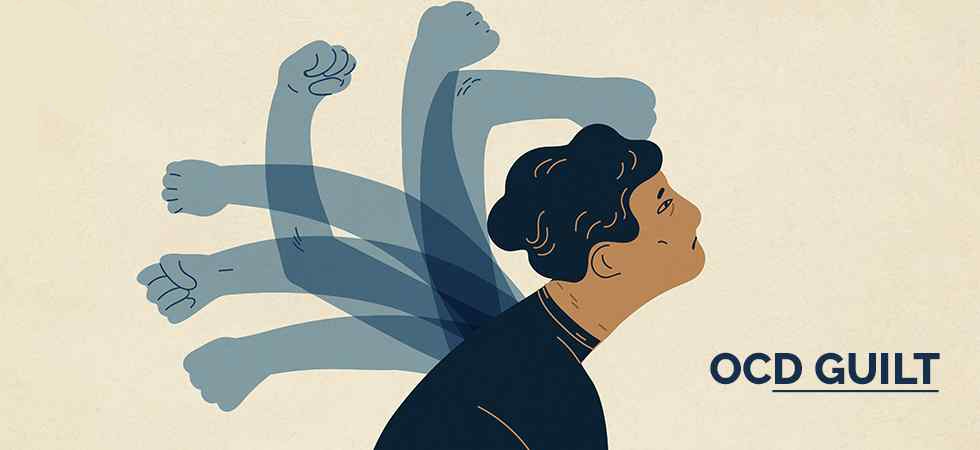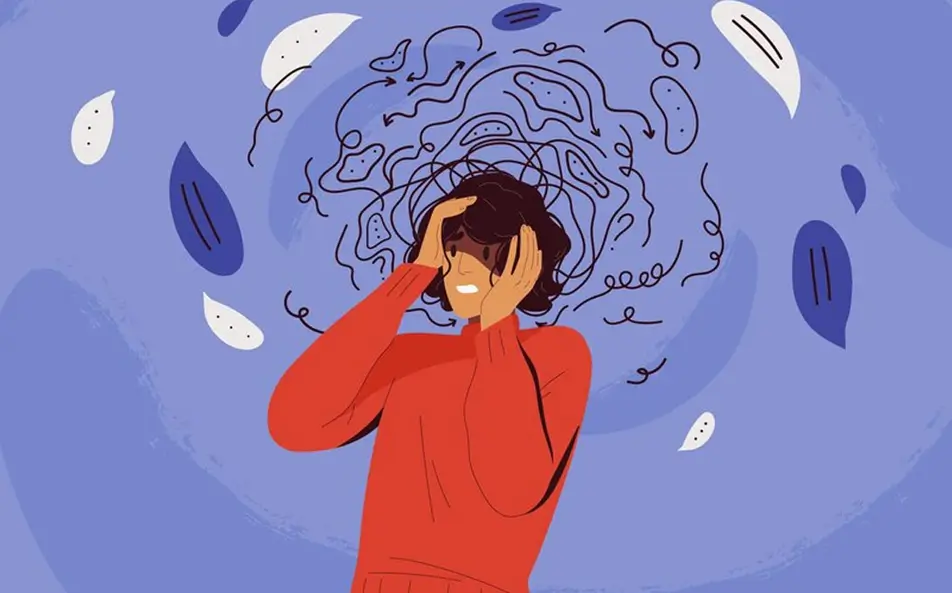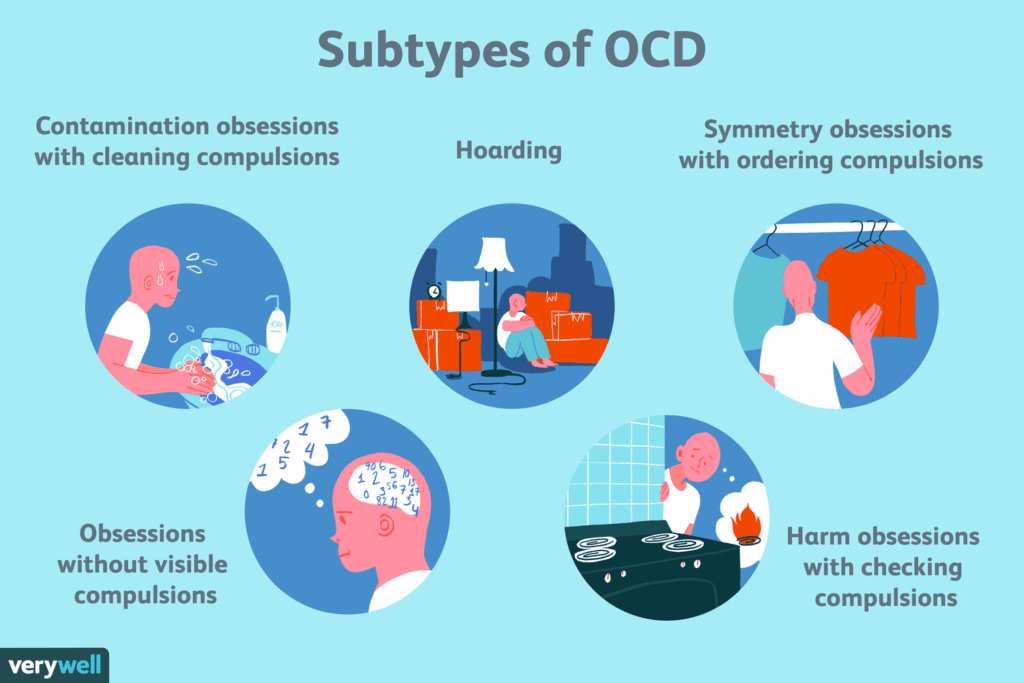Guilt OCD is a type of obsessive-compulsive disorder characterized by overwhelming feelings of guilt linked to intrusive thoughts. These thoughts are irrational, yet they cause significant distress. In this article, we explore the nature of guilt OCD and offer effective strategies for managing these painful symptoms.
Key Takeaways
- Guilt in OCD is often tied to irrational thoughts and can lead to compulsive behaviors that reinforce the cycle of obsession and anxiety.
- Cognitive Behavioral Therapy (CBT) and Exposure and Response Prevention (ERP) are effective treatments for managing guilt in OCD, focusing on confronting guilt-inducing thoughts and reducing reliance on compulsions.
- Utilizing self-help strategies such as mindfulness practices and self-compassion techniques can significantly alleviate feelings of guilt and improve overall well-being for individuals with OCD.
Understanding Guilt in OCD

Obsessive compulsive disorder (OCD) often brings with it an intense guilt, distinct from the guilt stemming from real wrongdoings. In OCD, guilt is frequently tied to irrational thoughts and fears, contributing to obsessive symptomatology and ocd obsessions. Many individuals with OCD experience guilt that is disproportionate to their actions.
Those with OCD patients often experience significant guilt stemming from self-punishment linked to irrational thoughts, which can exacerbate anxiety and depression.
Intrusive Thoughts and Guilt
Intrusive thoughts are a hallmark of obsessive compulsive disorder (OCD), and they often trigger overwhelming feelings of guilt. These unwanted thoughts, which can be irrational and distressing, lead individuals to fear they might harm or sabotage their loved ones. Even though these thoughts do not reflect true desires or intentions, the guilt they generate can be crippling. For example, someone might experience intrusive thoughts about committing immoral acts or socially taboo behaviors, leading to intense guilt. This guilt sensitivity can make individuals avoid situations that might trigger such thoughts, further isolating them.
Feelings of guilt in OCD are often signaled by not just right experiences (NJREs), where individuals feel something isn’t right despite the absence of real evidence. These NJREs contribute to the cycle of guilt, as fear of being guilty exacerbates the situation.
Exposure and Response Prevention (ERP) therapy, a key treatment for OCD, reduces distress from intrusive thoughts by encouraging individuals to confront their fears without resorting to compulsions, contributing to harm prevention.
Compulsive Behaviors Triggered by Guilt
Guilt in OCD often leads to compulsive behaviors aimed at alleviating the distressing feelings. These compulsive actions, such as compulsive checking or repetitive behaviors, are performed to mitigate the anxiety and guilt triggered by intrusive thoughts. However, these behaviors provide only temporary comfort and do not address the underlying issues, thus reinforcing the cycle of OCD.
The anxiety caused by guilt can drive individuals to engage in various compulsions, such as washing behaviors or compulsive checking, to prevent feared consequences or punish oneself for perceived wrongdoings. Unfortunately, these actions often fail to alleviate the deeper feelings of guilt and anxiety, perpetuating the obsessive-compulsive cycle.
Identifying these patterns is essential for effective OCD treatment and breaking the cycle of guilt and compulsion.
The Cycle of OCD and Guilt

Obsessive compulsive disorder involves a vicious cycle: obsessions cause anxiety, leading to compulsions to alleviate guilt, which in turn trigger more obsessive thoughts and obsessive compulsive symptoms. This cycle of obsession, guilt, and compulsion is self-reinforcing and exacerbated by distorted thinking. Each compulsion performed to alleviate guilt only strengthens the disorder, making it more challenging to break free from this exhausting loop.
Guilt sensitivity in OCD can cause significant distress, disrupting daily routines and responsibilities. Individuals may develop a chronic sense of unworthiness and a decline in overall daily productivity. Long-term guilt can exacerbate feelings of loneliness and hopelessness, making it imperative to address these issues comprehensively.
Common Types of Guilt in OCD

Recognizing the common types of guilt in OCD aids in developing targeted strategies for managing this distressing symptom. Individuals with OCD often experience intense guilt due to their obsessive thoughts, especially regarding harming others or making mistakes, which can be addressed through a guilt inventory and an understanding of trait guilt and guilt proneness.
Guilt in OCD can manifest in various forms, each with distinct triggers and characteristics, including oc symptoms.
Religious OCD and Guilt
Religious OCD, or scrupulosity, triggers intense guilt linked to moral failures or spiritual shortcomings. Individuals may experience obsessive thoughts about sinning or committing blasphemy, which lead to overwhelming guilt feelings. These obsessive thoughts compel them to engage in compulsions, such as repetitive prayers or confessions, to alleviate their distress.
However, these compulsive behaviors only provide temporary relief and often reinforce the cycle of OCD.
Real Event OCD Guilt
Real event OCD involves both obsessions and compulsions. These behaviors arise from real-life events or previous mistakes. Individuals with this type of OCD may obsessively review details of a past event, trying to determine how it could have been prevented and feeling immense guilt over perceived mistakes related to past events. The obsessive compulsive inventory revised can be a useful tool in understanding these patterns.
Constant self-questioning and guilt can be debilitating, impacting mental health and mood disorders daily functioning.
Perfectionism and Guilt
In OCD, perfectionism manifests as the belief that only perfection is acceptable, often resulting in increased anxiety and guilt. Individuals may feel a strong sense of responsibility for negative outcomes, exacerbating their feelings of guilt even in the absence of real danger. This relentless pursuit of perfection can intensify the cycle of guilt, as individuals feel inadequate if rituals are not performed flawlessly.
In perfectionism, guilt stems from not completing rituals or behaviors perfectly, reinforcing the cycle of guilt and compulsion. Childhood experiences, particularly parental criticism, can significantly contribute to these feelings, influencing self-perception and expectations.
Impact of Guilt on Daily Life

The pervasive guilt experienced by individuals with OCD can profoundly impact various aspects of daily life. Feeling responsible for negative outcomes can strain personal relationships, mental health, and work performance.
Relationships
OCD-induced guilt can cause individuals to avoid sharing their feelings, contributing to relationship strain. This avoidance can foster mistrust and conflict in personal relationships.
Connecting with loved ones or joining support groups can help individuals with OCD feel validated and comforted, fostering positive emotions and reducing isolation.
Mental Health
The mental health impact of OCD guilt is significant, often leading to a constant feeling of failure or inadequacy. Research suggests that individuals with OCD have heightened sensitivity to feelings of guilt, which can exacerbate mental health issues such as anxiety and depression. It is important to recognize that guilt associated with OCD is a symptom of the disorder. This guilt does not accurately represent a person’s moral character.
Many individuals with religious OCD face guilt-induced dilemmas regarding their faith and perceived sins, leading to emotional distress. Real event OCD can cause ongoing remorse and guilt from self-questioning about past decisions.
Having high standards for personal conduct can lead to feelings of guilt when individuals with OCD believe they have fallen short. Regular physical activity can enhance mood and help alleviate feelings of guilt associated with OCD.
Social and Occupational Functioning
Compulsive behaviors stemming from guilt can severely hinder work performance and social interactions. Increased guilt levels can result in heightened absenteeism from work or social events.
Structured routines can help individuals with OCD manage guilt more effectively, improving social and occupational functioning.
Cognitive Distortions and OCD Guilt
Cognitive distortions play a significant role in increasing guilt in individuals with OCD. These faulty thinking patterns can lead individuals to irrationally link their thoughts with deontological guilt and responsibility for causing harm, often resulting in abnormal processing.
Recognizing and addressing these distortions is crucial for assessing guilt related to OCD.
Common Cognitive Distortions
Common cognitive distortions in OCD include:
- Thought-action fusion: a person believes that thinking about an action is equivalent to actually performing it, intensifying guilt.
- Catastrophizing: individuals predict the worst possible outcomes from benign situations, contributing to excessive guilt.
- Emotional reasoning: individuals assume that because they feel anxious, something bad is inevitably going to happen.
- Exaggerated responsibility beliefs: these also play a role in intensifying guilt.
These faulty thinking patterns intensify feelings of guilt in individuals with OCD. Addressing these distortions is essential for reducing overwhelming guilt.
Addressing Cognitive Distortions
Cognitive Behavioral Therapy (CBT) helps individuals reduce guilt by:
- Recognizing and challenging distorted thoughts
- Challenging harmful thought patterns related to guilt
- Aiding in reframing irrational beliefs By recognizing and restructuring distorted thinking through CBT, individuals can significantly reduce their guilt associated with OCD.
Using CBT to address cognitive distortions is crucial for managing OCD-related guilt.
Effective Treatments for Guilt in OCD
Effective OCD treatments can relieve guilt related to the disorder. Combining professional treatments with self-help efforts is vital for managing this guilt.
Cognitive Behavioral Therapy (CBT)
Cognitive Behavioral Therapy (CBT) is a widely recognized approach for treating OCD, focusing on modifying unhelpful thoughts and behaviors. CBT encourages patients to confront guilt-inducing thoughts instead of suppressing them, fostering healthier responses. Addressing these thoughts reduces reliance on compulsions to cope with guilt, and behavior therapy can also play a significant role in this process, particularly in the context of clinical neuropsychiatry.
For example, individuals with religious OCD may engage in repetitive prayers or confessions to alleviate their guilt.
Exposure and Response Prevention (ERP)
Exposure and Response Prevention (ERP) therapy exposes individuals to guilt triggers without allowing compulsions. ERP prevents the urge to perform compulsions while facing guilt triggers, making it highly effective for OCD treatment.
Medication
Selective serotonin reuptake inhibitors (SSRIs) are commonly prescribed to mitigate obsessive thoughts in OCD. SSRIs reduce the frequency and intensity of obsessive thoughts related to guilt and lessen compulsive behaviors triggered by guilt, making them essential in OCD treatment.
Self-Help Strategies for Managing Guilt
Self-help strategies can effectively help individuals with OCD manage guilt and improve overall well-being. Implementing self-compassion techniques and increasing tolerance to uncertainty can significantly reduce guilt associated with OCD.
Mindfulness Practices
Mindfulness practices can help individuals with OCD observe their guilt compassionately and without judgment. By using mindfulness, individuals can recognize that OCD guilt is linked to intrusive thoughts and does not reflect true desires, helping them manage their guilt more effectively.
Self-Compassion Techniques
Practicing self-compassion helps individuals with OCD avoid harsh self-criticism for intrusive thoughts and compulsions. Self-compassion techniques, like self-kindness during perceived failures, ease guilt associated with OCD and foster a more forgiving internal dialogue.
Journaling and affirmations enhance self-compassion in those struggling with OCD by counteracting negative self-talk and providing a more compassionate inner dialogue.
Seeking Professional Help
Consulting a mental health professional is essential for effective, tailored OCD treatment. These professionals can provide personalized treatment plans that address the unique challenges of OCD, including its associated guilt.
Finding the Right Therapist
Selecting a therapist with specialized OCD training can significantly improve treatment outcomes. Seeking a therapist with specific expertise in treating OCD ensures effective care. This specialization ensures that the therapist understands the unique challenges of OCD and can provide the most effective interventions.
Support Groups
Support groups offer emotional support and practical coping strategies from peers with similar experiences. These groups offer a sense of community, allowing individuals with OCD to share their experiences and reduce feelings of isolation.
They enhance recovery by offering shared experiences and emotional strength from others facing similar challenges.
Summary
Understanding and managing guilt in OCD is essential for improving the quality of life for those affected by the disorder. From recognizing the nature of OCD-related guilt and its impact on daily life to exploring effective treatments and self-help strategies, this comprehensive guide provides valuable insights and practical tools.
Addressing OCD-related guilt requires a multifaceted approach, including professional treatment, self-help strategies, and the support of loved ones and peers. By combining these efforts, individuals with OCD can navigate their guilt more effectively, leading to a more balanced and fulfilling life.
Frequently Asked Questions
-
What is the main difference between general guilt and OCD guilt?
The main difference between general guilt and OCD guilt is that OCD guilt arises from irrational thoughts rather than actual actions, leading to heightened distress and interference with daily functioning.
-
How can cognitive distortions in OCD be addressed?
Cognitive Behavioral Therapy (CBT) effectively addresses cognitive distortions in OCD by helping individuals recognize and challenge their distorted thoughts, leading to reduced guilt and improved mental health.
-
What role do support groups play in managing OCD guilt?
Support groups play a crucial role in managing OCD guilt by offering emotional support and practical coping strategies from individuals with similar experiences, thereby alleviating feelings of isolation. Engaging with others can empower individuals to navigate their challenges more effectively.
-
How does ERP therapy help with OCD guilt?
ERP therapy effectively helps with OCD guilt by exposing individuals to their guilt triggers and preventing compulsive responses, thereby allowing them to confront and process their feelings without avoidance. This approach fosters resilience against guilt-related anxiety.
-
What self-help strategies are effective for managing OCD-related guilt?
To effectively manage OCD-related guilt, consider implementing self-compassion practices and mindfulness techniques, while also building your tolerance for uncertainty. These strategies can help alleviate the distress associated with obsessive thoughts.
Author
-
As the Medical Director at New England Psychiatric Consultants, I’m dedicated to elevating mental health care through compassionate, evidence-based practices. With a robust clinical background and leadership experience, I work closely with multidisciplinary teams to design and deliver comprehensive outpatient and consultative psychiatric services. I’m passionate about championing innovative treatment approaches and optimizing patient journeys from assessment through recovery.
Key Expertise & Achievements
-
Leadership in clinical operations, quality assurance, and regulatory compliance
-
Implementation of integrated care models that enhance patient access and outcomes
-
Expertise across mood disorders, anxiety, and serious mental illness
-
Advanced training in psychopharmacology, psychotherapy, and collaborative care strategies
Professional Approach
Driven by empathy, teamwork, and data-informed decisions, I strive to foster environments where clinicians and patients alike feel supported. Whether guiding team development, streamlining care pathways, or navigating complex cases, I take a thoughtful, solution-oriented stance. -
